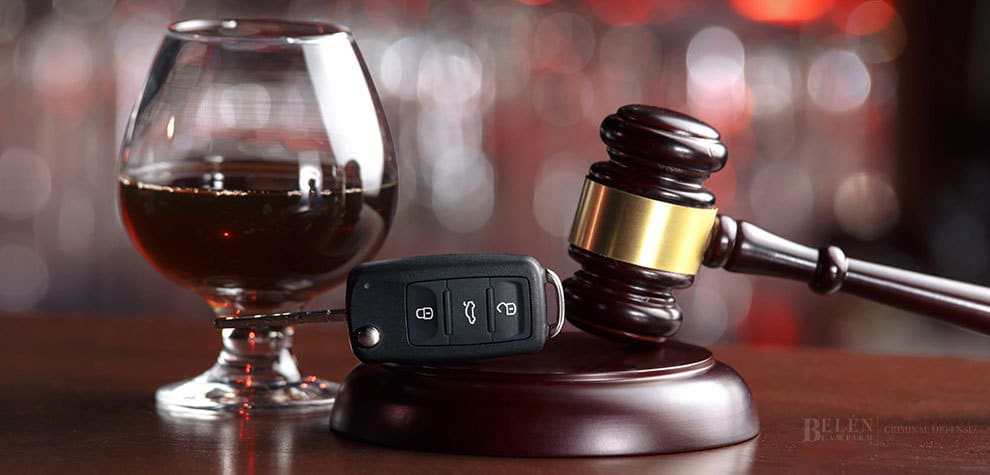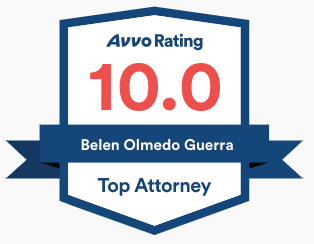DUI and DWI are both acronyms we hear a lot. DUI is Driving Under the Influence, and DWI is Driving While Intoxicated. Both are serious crimes in Arizona. But what’s the difference in getting a DUI vs DWI?
As the holidays approach with New Years Even soon to follow, you may be hearing these terms more often. DUI and DWI rates are likely to increase at this time of the year. But which crime is worse? Are there any other differences?
Belen Olmedo Guerra is a criminal defense attorney in the Phoenix area. In the following post, Belen will describe the criminal offenses of DUI and DWI, how they are the same and how they are different. We will also explain some related crimes, such as DWAI and felony DUI.
DUI vs DWI in Arizona
There are probably more similarities than differences between DUIs and DWIs. For example:
- Both DUI and DWI are criminal charges
- Each charge carries severe penalties with mandatory sentencing guidelines in Arizona
- Both involve alcohol or drugs
In some ways, these two charges are interchangeable. But there are differences in DUI vs DWI. The strongest difference is that DUI refers to behavior, while DWI refers to actual blood alcohol content.
Confused? Let’s break that distinction down.
A Few Examples in Arizona
Let’s say a man with a high alcohol tolerance goes out with friends and leaves the bar after four beers. He obeys the rules of the road perfectly until another driver runs a red light and crashes into the back of his car. Though no one is hurt, the police officer who arrives at the scene smells alcohol on the man’s breath. The man passes a field sobriety test. But his blood alcohol level is .09. The legal blood alcohol limit in Arizona is .08. Thus, the man gets a DWI. He did not endanger anyone, and the car accident was not legally his fault. But his blood-alcohol level was higher than the legal limit, meaning that he was driving while intoxicated.
Now on to DUIs. In our second example, a woman enjoys three potent cocktails at an office party. As she drives home, a police officer notices she is swerving and pulls her over. She fails a field sobriety test, but her blood alcohol level is only .079, below the legal limit of .08. Despite this, the officer can charge her with a DUI, because the officer witnessed the alcohol influencing her driving.
DUI vs DWI: Which is Worse?
In some states, DUI and DWI are interchangeable. In Arizona, they are separate charges. DWI is the more serious charge because it is also the one the state can prosecute more easily. Because DWI requires a blood alcohol level above the legal limit, there is concrete evidence of that charge.
Regardless of which charge you are facing, the penalties will be the same. They include fines, license suspension, jail time, and the implementation of an IID (ignition interlock device). The IID is a breathalyzer device fitted to your car that will not allow the car to turn on unless you blow a BAC below the legal limit.
Arizona DUI/DWI Penalties
DUI and DWI penalties will vary based on the driver’s BAC and the number of prior convictions. Below are penalties for a first-offense DUI as well as with historical priors.
First Offense in Phoenix
For a BAC of .08 to .149, you could be facing a minimum of 10 days in jail. Fines could total up to $1480, and the state can suspend your license for at least 90 days. You may also end up with an IID in your car for 6 months to a year.
For a BAC of .15 to .199, there is a minimum of 30 consecutive days in jail. Fines could reach up to $3000, with at least a 90-day license suspension. There will be an IID in your car for one year.
For a BAC of at least .20, there is a minimum of 45 consecutive days in jail. The fines increase to $3250, and a DUI of this kind also carries a 90-day license suspension.
Second and Third Offenses in Phoenix
Arizona punishes repeat DUI and DWI offenses harshly.
For a BAC of .08 to .149, you could be facing a minimum of 90 days in jail. Fines could total up to $3000 or more, and the state can revoke your license for at least 1 year. You may also end up with an IID in your car for a year.
For a BAC of .15 to .199, this is considered an Extreme DUI in Arizona. There is a minimum of 120 days in jail with 60 served consecutively. Fines could reach up to $3250 or beyond, with at least a 1-year license revocation. There will be an IID in your car for one year.
For a BAC of at least .20, you can expect a Super Extreme DUI charge in Arizona. there is a minimum of 180 days in jail, 90 of which must be consecutive. The fines increase to at least $4250, and a DUI of this kind also carries a 1-year license revocation.
A third DUI or DWI within seven years is a felony. It carries a mandatory prison sentence of at least four months, license revoked for one year, a two-year IID requirement, and over $4000 in fines and assessments.
DUI vs DWI vs OWI vs DWAI
Occasionally you might hear these terms used instead of DUI or DWI. DWAI, for instance, is “Driving While Ability Impaired”. This charge exists in some states but does not exist in Arizona.
OUI and OWI are “operating under the influence” and “operating while intoxicated”. These are the same as DWI and DUI.
Aggravated DUI/DWI
We already talked about multiple offenses within seven years resulting in an Arizona felony DUI or DWI. This is called an Aggravated DUI in Arizona. If you are driving under the influence with a minor in the vehicle, that is automatically an aggravated DUI.
Belen Law Firm Represents Criminal Cases in Phoenix
Whether you are facing a DUI or a DWI, a Phoenix criminal defense attorney at Belen Law Firm can help. If you or someone you love is facing DUI or DWI charges, you can call the Belen Law Firm 24/7 at 602.715.0908. You can also send us a message to schedule your free consultation today.





















